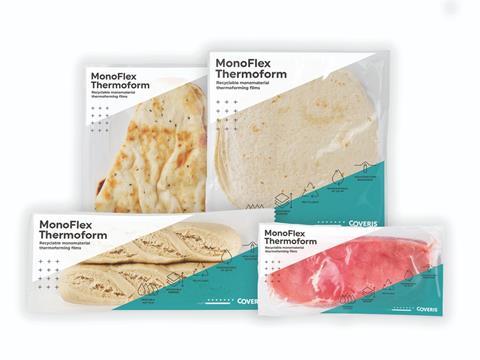
Coveris intends to replace non-recyclable materials in thermoforming packaging for food with its mono-material alternative, MonoFlex Thermoform.
Standard thermoforming substrates are made of mixed materials and are therefore non-recyclable, Coveris explains. Its mono-material solution is designed to overcome this roadblock and, as a result, reduce carbon emissions during its life cycle.
Available in polyethylene or polypropylene versions, MonoFlex Thermoform is said to be fully nylon-free. Depending on its product application or print requirements, it can be produced from single-substrate co-extruded or laminated films.
Its top film can be printed with conventional and HD flexographic or rotogravure print including matt, gloss, and tactile lacquer finishing options; alternatively, it can be left unprinted, with Coveris offering up its own labelling solutions for on-pack communication or branding.
MonoFlex Thermoform reportedly provides ‘advanced’ EVOH barrier properties and strong puncture resistance to protect the product and extend its shelf life. Such features have been developed, tested, and validated by Covers’ Film Science Lab and Pack Innovation Centre, the company explains.
As the latest addition to its MonoFlex range, MonoFlex Thermoform is designed to align with Coveris’ No Wate strategy and enable a transition into alternative substrates without compromising packing speeds or functionality. Its potential applications include baked goods and foods in the meat, fish, poultry, and dairy sectors.
“The development of MonoFlex Thermoform is a significant development from the Coveris Group,” said CEO Christian Kolarik. “Manufactured across multiple locations supporting our vision for No Waste, our monomaterial, recyclable MonoFlex Thermoform films are a direct replacement for non-recyclable alternatives currently used.
“The launch of this material enables a significant amount of plastic packaging to be captured through recycling processes, achieving environmental benefits including carbon footprint reduction and the re-direction of materials away from landfill.”
Other recent additions to Coveris’ portfolio include its Formpeel P and Formpeel T thermoforming films for medical packaging, as well as its Unterland R and Unterland Crystal stretch films for silage bale wrapping.
In another development, Ascend Performance Materials‘ amorphous nylon for packaging films, HiDura LUX, is designed to provide safe food contact and high oxygen and moisture barrier properties.
If you liked this article, you might also enjoy:
The L’Oréal approach to packaging sustainability
The way we talk about plastic needs to change – here’s how to get it right
What steps is Apple taking to make its packaging more sustainable?














No comments yet